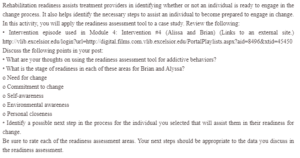Rehabilitation Readiness
I believe that the success of using the readiness assessment tool for addictive behaviors is dependent on an individual’s willingness to change. It can only work if the person sincerely wants it to work. A person may experience difficulties in overcoming their addictions if they do not have enough belief and will to change (Lal et al., 2018).
Alissa is in the contemplation stage on the need to change. She realizes she has a problem and confesses that she loses every time. She sometimes feels depressed because of her gambling. Her commitment to change is in the contemplation stage. She resists the idea of going to a rehab facility as she does not consider her gambling a problem. She, however, states that before she can go to the facility, she would have to check it out first. Alissa is in the contemplation stage of self-awareness. She says that winning makes her happy. She also admits that she thinks she has a problem. She sometimes gets depressed after losing. Alissa is in the pre-contemplation stage in environmental awareness. She spends most of her time in the casino. This contributes to her gambling as she can’t stop once she starts. She dismisses her friend and boyfriend, who try to get her to stop gambling. The stage of readiness in personal closeness is the preparation stage. Her family and friends have organized an intervention to make Alissa aware that her gambling is a problem. They recommend that Alissa join a rehabilitation facility. Do you need help for completing your assignment ? We offer assignment help with high professionalism.
I believe the tool would be effective if friends and family were involved to provide the support. Alissa’s next step would be to start making experimental small changes in her behavior in preparation for the action stage (Walton et al., 2017). This can be made possible with the support and motivation of her family and friends.
References
Lal, R., & Singh, S. (2018). Assessment tools for screening and clinical evaluation of psychosocial aspects in addictive disorders. Indian Journal of Psychiatry, 60(Suppl 4), S444.
Walton, M. A., Ngo, Q. M., Chermack, S. T., Blow, F. C., Ehrlich, P. F., Bonar, E. E., & Cunningham, R. M. (2017). Understanding Mechanisms of Change for Brief Alcohol Interventions Among Youth: Examination of Within-Session Interactions. Journal of studies on alcohol and drugs, 78(5), 725–734. https://doi.org/10.15288/jsad.2017.78.725
ORDER A PLAGIARISM-FREE PAPER HERE
We’ll write everything from scratch
Question
Rehabilitation readiness assists treatment providers in identifying whether or not an individual is ready to engage in the change process. It also helps identify the necessary steps to assist an individual to become prepared to engage in change. In this activity, you will apply the readiness assessment tool to a case study. Review the following:

Rehabilitation Readiness
• Intervention episode used in Module 4: Intervention #4 (Alissa and Brian) (Links to an external site.) http://vlib.excelsior.edu/login?url=http://digital.films.com.vlib.excelsior.edu/PortalPlaylists.aspx?aid=8496&xtid=45450
Discuss the following points in your post:
• What are your thoughts on using the readiness assessment tool for addictive behaviors?
• What is the stage of readiness in each of these areas for Brian and Alyssa?
o Need for change
o Commitment to change
o Self-awareness
o Environmental awareness
o Personal closeness
• Identify a possible next step in the process for the individual you selected that will assist them in their readiness for change.
Be sure to rate each of the readiness assessment areas. Your next steps should be appropriate to the data you discuss in the readiness assessment.


